COIN OPP: 10 of the best play-to-earn games set to drop in 2022

Pic:Getty
In part one of our GameFi exploration this week, we delved into what makes the sector tick – what it is and why big backers are throwing dough its way. Here, we bring you our picks for the hottest upcoming DeFi/P2E games in 2022.
In other words, games that look like classic time wasters (i.e. a whole lot of fun) but also feature genuine capacity to play and earn, generate yield, and/or serve as potentially lucrative investments. So maybe not time wasters at all, then.
Loading… with an industry-standard caveat: absolutely none of this is financial advice.
Stockhead’s top 10 play-to-earn games for 2022
There are at least a couple of hundred play-to-earn games either developed or developing and, according to Sascha Zehe from the GameFi platform and guild Polemos, the amount that will emerge over coming years “will be staggering”.
With that in mind, this isn’t a definitive list but it’s certainly what’s catching our eye from a whole crop of blockchain games coming soon.
In no particular order, then…
1. HEROES OF MAVIA
Blockchain: Ethereum
Heard of Clash of Clans? Stupid question. The upcoming Heroes of Mavia is pretty much that game, with a crypto-culture twist, on the blockchain.
It self describes as the “first AAA blockchain base builder” and is a player vs player (PvP), mobile-based strategy game where armies and bases are used as the in-game assets in battles for crypto.
The game was recently described by EllioTrades* in his excellent regular newsletter as a potential “blockbuster” with a “simple, compelling gaming loop”, “good tokenomics” and “stellar partnerships”.
Some of those partnerships and backers include huge crypto-gaming development funders Animoca Brands, Hashkey Capital, Binance Labs and Alameda Research.
Adopting a common token-structure model pioneered by the game Axie Infinity (AXS), Heroes of Mavia has a dual-coin system, including the MAVIA “governance” token and the in-game “rewards currency” RUBY. Here’s a quick breakdown…

What’s more, beyond huge backers, a well-thought-out in-game economy and a gaming loop based on a proven, successful structure, Heroes of Mavia has a large, active and growing community (nearly 85,000 members on Discord) itching to play the game when it eventually launches (likely Q4 2022).
According to reports, an “initial token offering” of MAVIA is rumoured to be happening in Q2.
You can learn more about the project, its NFT assets (including virtual land/bases, heroes and statues) and stay up to date with its announcements on its Medium channel, here.
*EllioTrades is the alias of Elliot Wainman, founder of the NFT marketplace and project incubator SuperFarm as well as a cyberpunk-themed NFT and DAO-based gaming ecosystem called Neo Tokyo, which he founded with fellow gaming influencer Alex Becker. If you want to keep up with good crypto-gaming projects, both these guys are well worth a follow.
2. ILLUVIUM
Blockchain: Ethereum, Immutable X
We’ve covered Illuvium a couple of times before. But as it’s one of the most respected projects building in the sector due to influential tokenomics, lush-looking design, rich lore and super-detailed gameplay, it has to make this list.
Illuvium is a Pokémon-inspired*, sci-fi auto battler that also incorporates a vast, 3D open-world role-playing game element based around the acquiring of NFT assets, capturing of NFT creatures (called Illuvials), building and land ownership.
The game was one of the first in development with the aim of bringing AAA-quality to the blockchain-gaming space and has been actively collaborating with various other gaming and metaverse projects as it continues to develop.
It’s also built a huge and loyal community frothing to play the main game when it launches (likely Q2), as well as a base-building, mobile-based mini-game called Illuvium Zero.
Illuvium currently has about 271k Twitter followers and more than 200k on Discord and that appears to be growing daily, no doubt helped by some huge gaming guilds attached to the project, including Yield Guild Games and Polemos.
This has been proven once again by the recent small pump. We are so so so early it’s not even funny. Just wait until the North Americans find a game they will enjoy. GameFi is going to go on a mission to the moon https://t.co/OaFGPuXI3p
— Kieran.eth (@KieranWarwick) February 8, 2022
Keep an eye out for the game’s upcoming Illuvitars NFT avatar drop and its first land sale which has still not yet been announced but is due this quarter. Land sales in hot-ticket, popular games with huge, loyal communities (and Illuvium most definitely fits that bill), have proven to be pretty lucrative pick-ups for some.
Can’t wait for #Illuvitars to come out.. Im in need of a new profile pic! Amazing Art work!! 💯 #NFTgaming #Illuvium https://t.co/44Bpk17Ef1
— Illuvinator.eth (@illuvinator) January 2, 2022
Some of the ways to earn in the game will include: capturing Illuvial NFTS; farming materials; crafting items; playing the marketplace; wagering on in-game battles and earning rewards from various gameplay.
Illuvium’s economy is powered by two ERC-20 cryptocurrencies called ILV and sILV (which stands for synthetic ILV) and these power the game in different ways.
ILV allows holders to partake in yield farming, staking and the governance of the Illuvium DAO (decentralised autonomous organisation). And sILV is used as in-game currency for things like skins, emotes and various enhancements to enrich the player’s experience.
🚨🚨. WIP Survival Mode alarm – the team is starting to implement sounds into Survival Mode and lighting to bring the beta to life. #Illuvium #illuvium #ILV #crypto #nft #defi #gamefi #autobattler #privatebeta pic.twitter.com/a3Rz4FTaoG
— Illuvium (@illuviumio) February 8, 2022
In addition to this structure and the game’s NFTs, which each have their own unique market value, the ILV token is also well worth considering holding for its yield-generating staking capacity alone, even if you don’t plan to play the game.
The most basic level of staking ILV, through Illuvium’s core pools, has in the past provided as much as 80% APY (variable). But “yield farming” through Illuvium’s Sushi Liquidity Pool (which requires staking both ETH and ILV together) has seen users earn at a rate of up to 550% APY. Yield earnings can be realised in either ILV or sILV.
Note: Illuvium is in the process of altering and upgrading its staking functionality to Staking V2, which you can read about here.
And you can read more about the game in our Q&As with its Sydney-based co-founder Kieran Warwick here… and here, as well as keeping up to date with the latest info on its Medium channel.
3. PHANTOM GALAXIES
Blockchain: Ethereum
Like a few others you’ll find on this list, Phantom Galaxies is a serious AAA sci-fi blockchain-game contender, and it’s clearly one with some substance based on the impressive gameplay footage released so far.
Due for an early-release game launch some time in Q3 this year, the game’s website says it combines an “open-world space sim” with a “fast-paced mech shooter and captivating story”.
Take a gander at its trailer…
Yes, that’s a “cinematic trailer”, but it features actual game footage. And it’s Unreal Engine 4-built gameplay that has already been beta-tested by enthusiastic members of its community and various influencers. The hype is there for this one.
Beyond that, though, there are a couple of other major things about this NFT-enabling action-adventure game that might stand out to potential players/investors. And those are the two main companies developing it – Animoca Brands and Blowfish.
As has been covered by Stockhead, the formerly ASX-listed, now Hong Kong-based Animoca Brands is a major player in the blockchain-gaming scene.
It’s a gaming studio and venture capital firm that’s been responsible for developing and backing some of the most successful live, and building, projects in the space to date, including The Sandbox and the Sky Mavis-created Axie Infinity, among about 150 others.
Blowfish Studios, meanwhile, is a Sydney-based indie gaming studio acquired by Animoca, and it has some serious chops, having produced multiple cross-platform console/PC/Mac games including YesterMorrow, Siegecraft Commander, and Storm Boy.
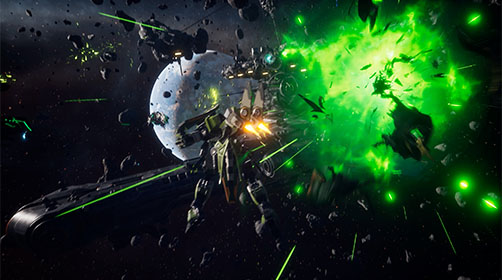
But back to Phantom Galaxies… the game will be featuring “generative avatars”, upgradable mechs and planets, which will all be ownable NFTs. And the planets will able to earn their owners passive yield through a staking function, according to an official announcement in the project’s Discord. You can read more about how that will work here.
As for the mechs, our understanding is that the idea is to upgrade them over time through the course of gameplay and rewards, so that they can become more powerful and more valuable for open-market selling, should you choose to do that.
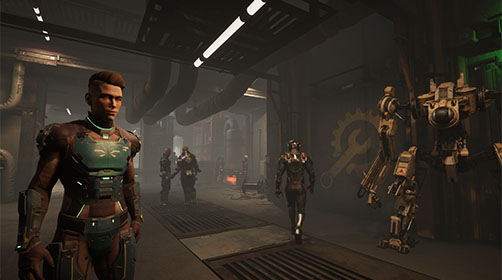
In the Discord announcement, the developers confirmed that “the common Starfighter and Avatar NFTs required to play the game will be around the same cost as a traditional AAA game”.
Here’s what else we know so far about the game’s economy, according to the project’s litepaper:
“Phantom Galaxies will have a range of non-fungible and fungible tokens that are used for Governance, Starfighter Fusion, and entry into certain activities. In-game resources and materials will be represented by uncapped fungible tokens that can be harvested and scavenged in the open universe and then traded on the Phantom Galaxies marketplace.”
You can also check out the project’s Medium articles to keep up to date with NFT sales and other developments.
4. GUILD OF GUARDIANS
Blockchain: Ethereum, Immutable X
Guild of Guardians, also commonly referred to as GOG, is a mobile-action PvE (player vs environment) RPG being developed for Android and iOS.
This one is free to play and is being described by its developers as “play AND earn”, which is meant to emphasise that the game sets out to be fun and engaging first, rather than something to just play/grind TO earn. (To be fair, all the games we’re presenting on this list are also going for a quality-gameplay vibe first.)
Featuring an immersive fantasy theme and party-led, dungeon-crawler gameplay, it’s an ambitious-looking game, if its trailers are anything to go by. But with a “public alpha release” scheduled for the first half of this year, and some cool-looking gameplay footage recently released, it looks like it’s a game on its way to delivering its roadmap.
Guild of Guardians pre alpha mobile gameplay. Be a part of the play and earn movement. The future is almost here!#WeAreGuardians #PlayAndEarn #GuildOfGuardians pic.twitter.com/0dm6x2GBO5
— Sonny (@Sunny_Bern) October 26, 2021
The game is being produced by the Sydney-based company Immutable, creators of the NFT trading-card game Gods Unchained, as well as the Ethereum layer 2 scaling network Immutable X (IMX). And it has some massive partnerships already established, including Ubisoft, The Sandbox and Yield Guild Games.
GOG has some interesting GameFi economics. We’re only scratching the surface here, but players can begin the game for free with common “heroes” that are not yet NFTs and not yet tradable on a marketplace. Through playing the game over time, heroes can level up and ascend into the rare NFT versions to earn more or be sold on the open market.
“Gems”, meanwhile, are the in-game currency/rewards earned through gameplay, and are traded under the ticker GOG.
You can learn more about the game and its tokenomics here.
5. MONKEY LEAGUE
Blockchain: Solana
Renamed Monkey League only just recently (it was originally called MonkeyBall), this Solana-blockchain-built P2E football game has at least two ingredients for success – NFT apes, which seem to have never-ending popularity in the cryptoverse, and turn-based, fast-paced arcade-style football gameplay.
If it’s done well, the latter aspect should see the game slot in perfectly to the burgeoning gaming guild and esports environments. It helps that there has already been plenty of hype around this project, despite its MBS token suffering a pretty significant and sustained price dump post launch.
There’s not much in terms of gameplay footage yet, although that’s set to come this month, and the game is rumoured to be going live in Q2 this year.
MonkeyBall Monkeys don't just have killer looks and Skills on the field…
They know how to BUST. A. MOVE! 🐵🕺
Sound on.$MBS #NFT #cryptocurrency pic.twitter.com/9SUhCofUBj
— UNKJD (@UNKJDgames) January 28, 2022
The GameFi economy seem simple enough on the surface – play and compete for MBS tokens by strategising and winning matches, upgrading NFT players as you progress.
There’s a fair bit more to it than that, of course, however, including three game modes (PvE; PvP; and TvT – team vs team), as well as the ability to own stadiums and host matches and earn more from the in-game economy that way, too.
Check out the project’s whitepaper here.
6. STAR ATLAS
Blockchain: Solana
Star Atlas is another high-profile (in the cryptoverse at least), sci-fi-themed, play-to-earn game with vast, multi-world scope and big ambitions.
Building on Solana, the game has a dual-token GameFi economy (the ATLAS utility token, and the POLIS governance/DAO token) and is a sweeping, RPG space-strategy game set in the year 2,620. (Wonder what BTC, ETH and SOL will be worth in 600 years, incidentally…)
In development and being released in stages, the game will be set up for players to hunt, obtain, trade and create various NFTS within its universe, including spaceships of various size and value. Some of these are available to buy now.
Yield Guild Games had apparently been purchasing about US$1 million worth of the game’s assets, including rare “Calico Guardian” spaceships, which were at one time selling for as much as US$45,000.
As you can see from the trailer, above, Star Atlas, like Illuvium, is taking the AAA, cinematic-quality approach, and is using Unreal Engine technology to do so.
The full launch of the game is said to be rolling out further this year.
7. BIG TIME
Blockchain: Ethereum
Big Time is another monstrously big project targeting the AAA-quality sci-fi gaming genre.
Free to play, this one’s a multiplayer action RPG set across time and space in a kind of Diablo 2, World of Warcraft, Back to the Future (not really) mash-up, intersecting with the blockchain. Or something like that.
Think dinosaurs vs cowboys, ninjas vs robots, battling bosses, gathering loot, levelling up and exploring vast, open worlds with friends. Oh, and think ownable NFT characters, items and land ownership.
The latter “land” aspect is known as “SPACEs”, and these are NFTs representing the size of your personal area of space in the game, which is accessible through a “time machine” portal. They come in different sizes and, of course, prices, and can be customised, rearranged and furnished as you see fit.
Although the game is free to play, buying many of the NFTs needed to get the best from the game isn’t. The smallest SPACE (Rare Small) currently starts at about US$350, and the biggest (Exalted Large SPACE) fetches about US$24,500.
You can read more about how Big Time’s SPACE ownership works and how it benefits users here.
The team on this one is definitely worth noting. Its CEO is Ari Meilich, the founder of the most successful decentralised metaverse project to date – Decentraland – and he’s assembled all sorts of talent from the biggest titles in gaming, including Fortnite, League of Legends, World of Warcraft, Call of Duty, Gears of War and more.
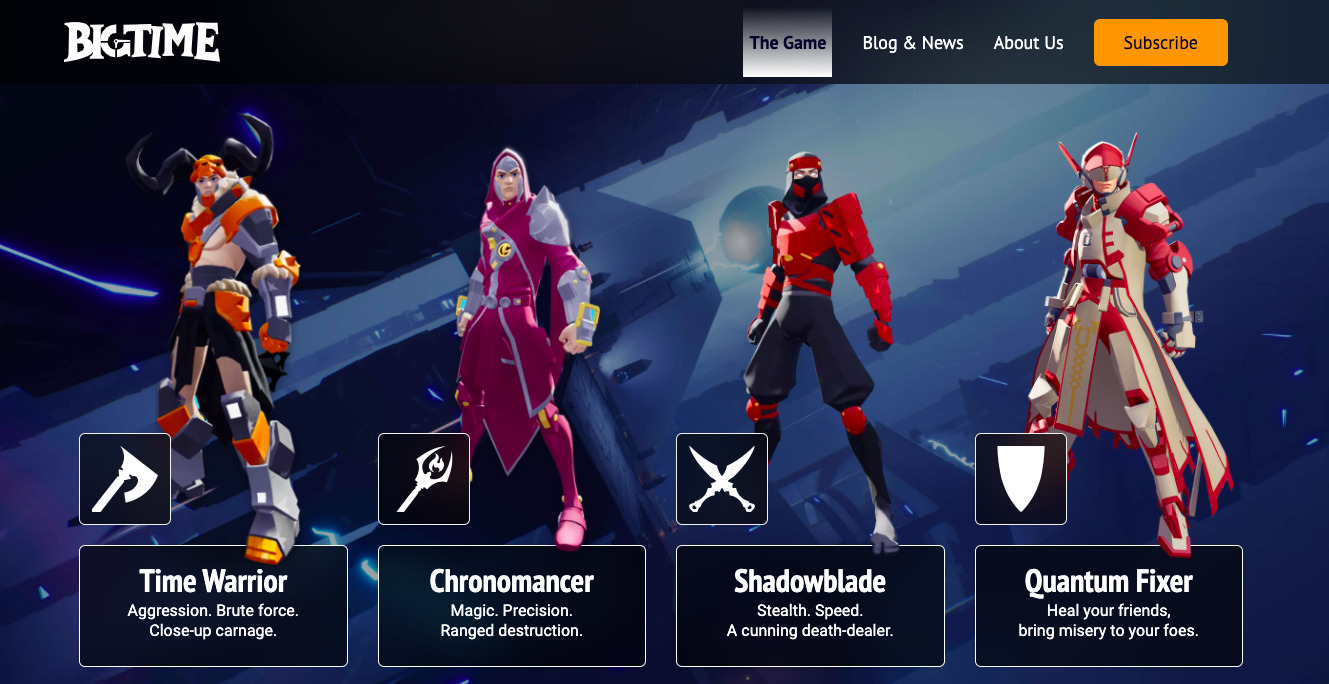
In terms of play-to-earn functionality, the game’s token has been set up to primarily be acquired through gameplay (so not so much on secondary markets or exchanges). And in order to do this, you do need to get yourself some SPACE, as well as what’s called a Time Keeper and an Hourglass (see below). As long as the Hourglass sand is running, you’re earning crypto as you play.
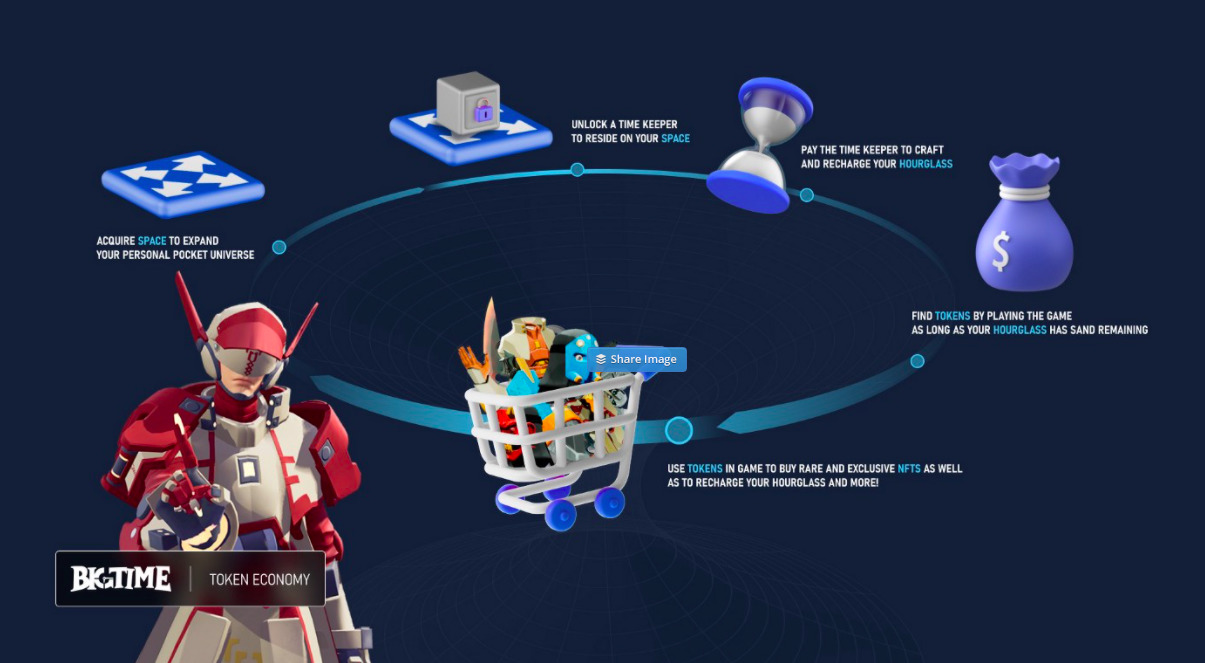
The game’s launch date hasn’t been released yet, although it’s definitely this year and rumoured to be… “soon”.
8. GALA GAMES: The Walking Dead Empires
Blockchain: Ethereum
Powered by the GALA token, Gala Games is already a highly successful gaming project that has built, and continues to build, a suite of blockchain-based NFT games, each of which provides players with ownership of their in-game items (eg. land, equipment, vehicles, etc) and runs on thriving P2E economies.
GALA is used as a medium of exchange between the various games’ players and platform’s users. And, as two of the games in the stable began to gain traction late last year, the token really shot up in value, surging from about US$0.02 in September all the way above US$0.70 in November. (It’s sitting at about US$0.34 at the time of writing after falling all the way to $0.18 in the recent market slump.)
Gala’s current playable titles include the PvP brawler Spider Tanks, which has been gaining esports traction, and the town/city organisation simulation Town Star. Both of these have been functioning as popular P2E games since last year, but there’s also been some excitement about the announcement of some new games, which has helped to push the GALA price back up just recently.
One of the most hyped of these upcoming titles (and a very honourable mention to fantasy RPG epic Mirandus, too) is The Walking Dead: Empires. That would be partly, perhaps mainly, thanks to the TV show’s massive fan base and a collaboration with AMC and Ember Entertainment.
According to Gala, The Walking Dead: Empires is a survival MMORPG where players will establish a plot of land, gather materials, build bases and defend the area against “walkers” and other players.
Players can purchase “Dead Claims“, which are NFTs that will enable the securing of plots of land prior to the game’s release. The land sale is currently live, but they look to be close to selling out, even though this stuff ain’t cheap.
According to Gala’s website, the most affordable land plot (Dead Claim: Georgia – Common) right now will set you back about US$5,450. Nuts, eh? The game had better be good. And it does look good (see image below).
Details about how the in-game, GALA-token-based economy will work for this one seem to be thin on the ground for the moment, but we’ll look to update this when we learn a bit more.
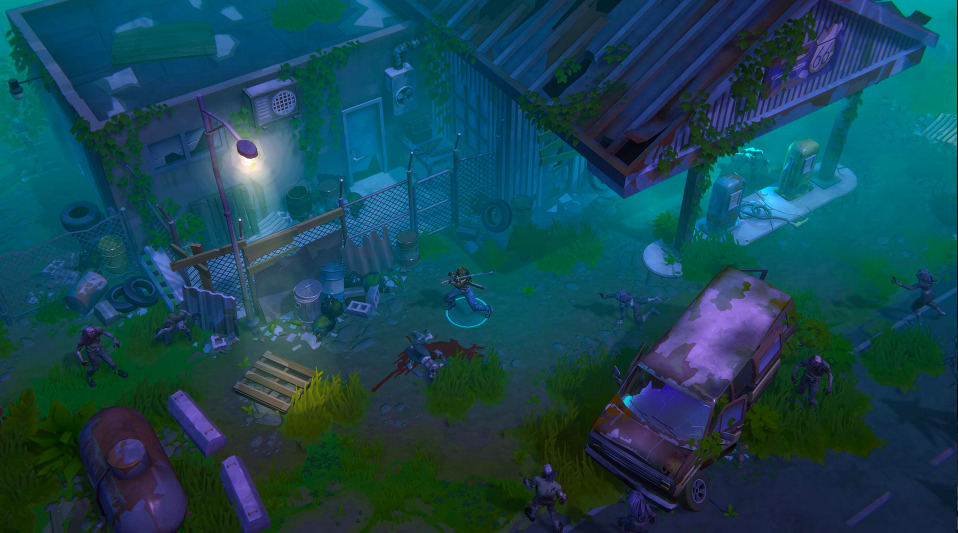
9. AAVEGOTCHI: Gotchiverse
Blockchain: Ethereum, Polygon
Aavegotchi is a popular crypto-collectible game featuring heavily pixelated ghost characters that look like they’ve escaped from Pac-Man, mated with a Tamagotchi and developed a bit more personality. At least that’s the initial impression we had. There’d want to be more to it than that, and there is.
Launched by developer Pixelcraft Studios in February 2021, this addictive-looking game is built on the tenets of DeFi (staking, lending, yield farming) and pixelated, Tamagotchi-style fun.
Players need to first buy some GHST tokens in order to acquire NFT assets in the game, including an Aavegotchi character. Then they can start yield farming, trading and developing/improving their “Gotchis” with “wearables” and other items. GHST tokens can be staked to earn “frens” (in-game friends), get the wearables, or sell in-game lottery tickets.
The basic P2E principle is that the rarer your Gotchi becomes, the higher the GHST-token earning capacity it will have.
Rumoured to be launching some time in March or April, according to Aavegotchi Discord chat, the “Gotchiverse REALM” game, meanwhile, will bring a much-anticipated, open-ended metaverse element to the world of Aavegotchi.
Describing itself as a “DeFi MMORPG”, it will enable Gotchis to explore a massive social space, interacting more freely and accessibly with each other, engaging in mini-games, combat, crafting, farming, trading and whatever else the Aavegotchi DAO (decentralised autonomous organisation) can dream up.
Two Gotchiverse land sales have already taken place, with a third said to be happening around the time of the realm game’s launch. Nothing has been confirmed by developers on that just yet, though.
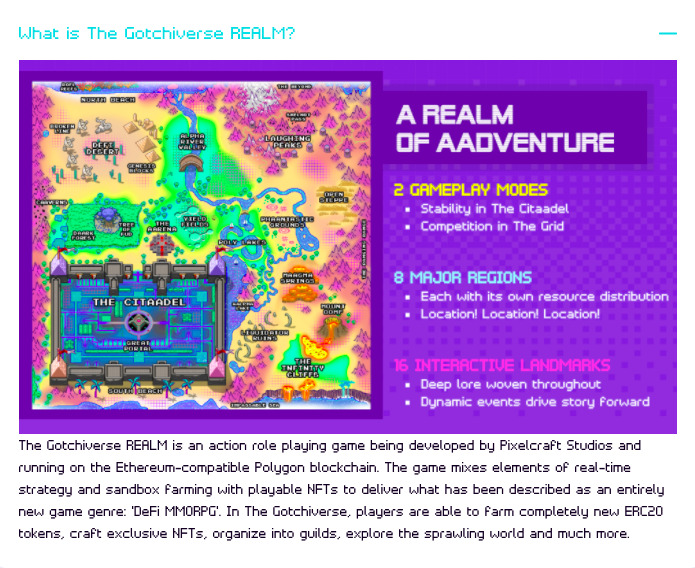
In summary, then, Aavegotchi and its upcoming Gotchiverse draws on the nostalgia for, and addictive nature of, the original Tamagotchi game phenomenon, enriching that idea through DeFi mechanics as well as open-ended world exploration with the possibility of digital land ownership and monetisation of said land.
https://twitter.com/GBMauction/status/1470505812430929924
10. FANCY BIRDS
Blockchain: Ethereum, Polygon
Last but not least, Fancy Birds (FNC) is the first title being launched by a gaming studio called Fancy Games, which is targeting the extremely popular casual mobile-gaming sector.
Paying considerable homage to the original “Flappy Bird” (a mobile game that took the world by storm back in 2013 with its super-simple, frustratingly addictive, tap-happy gameplay), Fancy Birds takes the concept to whole new levels.
The game is building in PvP tournaments, PvE events, NFT bird-breeding capabilities (only achievable through holding at least one of its special 8,888 Genesis birds), land ownership, skins customisation, and much more.
Incase you missed our AMA yesterday with @polemos_io you can catch it now on youtube! https://t.co/TWkY7tgSP5#PlayToEarn #P2E
— Fancy Birds Official (@Fancybirdsio) January 6, 2022
In contrast to other projects adopting the dual-token Axie Infinity model, Fancy Games has decided to pursue a singular token model (FNC) for the game, to give extra power to this one token.
As the gaming guild Merit Circle notes: “To start off a fair distribution among those working hard in-game, 40% of the total supply of FNC is dedicated towards in-game rewards.”
Illuvium founder Kieran Warwick, one of several notable identities in the crypto gaming and DeFi sectors backing the mobile tapper, tweeted this just the other day…
There is a Flappy Bird equivalent launching imminently, and 40% of the supply is in-game rewards. And it's on mobile…
Align the dots, and you realise how many P2E players are going to come flocking.
It's not even iykyk; it's just obvious as fuck.
— Kieran.eth (@KieranWarwick) February 5, 2022
For a bit more on Fancy Birds, hear it from the source – check out our latest Q&A with one of the project’s main guys, Chief Operating Officer Mike Merritt.
Games, games and more games: industry-expert picks
There are plenty of P2E games that could’ve easily made our list of 10. Helpfully, though, CryptoPlay, an expanding team of blockchain-tech enthusiasts, reached out to us with a great list of their own.
It pretty much covers everything we were also considering, and some we weren’t. You can delve into that 50-strong list of theirs here.
But for further insight, recently we’ve been asking some other crypto-industry players for their 2022 blockchain-gaming picks and predictions. Here are some of the games they’ve told us to keep an eye on…
Kieran Warwick (Illuvium co-founder): Fancy Birds; and Illuvium (of course)
Sergei Sergienko (Crypto Gaming United co-founder): Aavegotchi; CryptoBots; Waves Ducks; Samurai Legends (formerly RisingSun)
Sascha Zehe (Polemos co-founder): Illuvium, Galaxy Fight Club; Monkey League; Fancy Birds; Altered State Machine
George Harrap (Step Finance founder): Star Atlas; DeFi Land
“Redemption” aka “Red” (Harvest Finance community manager): Parallel.life; Missing Frontier
“Liquidity Wizard” (Tokemak founder): Illuvium; Ember Sword
Mike Merritt (Fancy Games COO and co-founder): Illuvium, Neo Tokyo; Pegaxy; and Fancy Birds (natch)
Related Topics
UNLOCK INSIGHTS
Discover the untold stories of emerging ASX stocks.
Daily news and expert analysis, it's free to subscribe.
By proceeding, you confirm you understand that we handle personal information in accordance with our Privacy Policy.








